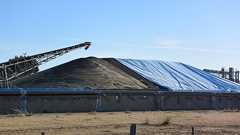China hits Canada with canola bans
29/03/2019 12:00

ONGOING trade and diplomatic tensions between China and Canada, which have seen China ban two major Canadian canola exporters from bringing product into China will not provide significant opportunities for the Australian canola sector.
"The drought means we have very little surplus canola about," said Nick Goddard, Australian Oilseeds Federation (AOF) executive manager.
"We had a very poor canola season last year, the second worst in a decade, producing about 2.2 million tonnes, so there isn't the supply to allow large scale exports to China," Mr Goddard said.
"If this had happened in a year with more normal canola production it would be an opportunity to sell more into China but this season there is not a lot of uncommitted canola around, you've got the domestic industry with about a million tonnes of demand and then the long-term export customers, and very little volume beyond that."
He said any additional exports, if they did occur, would come out of Western Australia where the season was better, although at present the price to the European Union is higher than that into China.
There is speculation the Chinese action, which impacts major Canadian exporters Richardson International and Viterra, may spread to all Canadian canola exporters.
It is being reported the trade ban is in relation to the Vancouver arrest of a high ranking official with Chinese telco giant Huawei last year to face an extradition warrant to the US.
However, officially, Chinese customs have said pests were detected in shipments resulting in the crackdown.
Should the ban continue it has the potential to inflict serious damage on Canadian canola producers, who are planning a slightly larger crop than last year according to recent Ag Canada forecasts.
China buys a whopping 40 per cent of total Canadian canola exports each year.
Total Chinese demand for imported canola seed is about 4-4.5 million tonnes a year, a large figure, but insubstantial compared to the 90m tonnes of soybeans it brings in annually.
China has taken similar non-tariffs measures against Australian barley exporters, launching an anti-dumping investigation last year which has the potential to halt exports to Australia's largest single buyer of barley.
Traditionally, Australia and North America have been important suppliers of grain to China, but Chinese investment into its Bent and Road infrastructure initiative means large amounts of grain can now be moved into the country through inland ports in the nation's west, opening up potential for more trade with former Soviet Union states that produce large volumes of grain.
"The drought means we have very little surplus canola about," said Nick Goddard, Australian Oilseeds Federation (AOF) executive manager.
"We had a very poor canola season last year, the second worst in a decade, producing about 2.2 million tonnes, so there isn't the supply to allow large scale exports to China," Mr Goddard said.
"If this had happened in a year with more normal canola production it would be an opportunity to sell more into China but this season there is not a lot of uncommitted canola around, you've got the domestic industry with about a million tonnes of demand and then the long-term export customers, and very little volume beyond that."
He said any additional exports, if they did occur, would come out of Western Australia where the season was better, although at present the price to the European Union is higher than that into China.
There is speculation the Chinese action, which impacts major Canadian exporters Richardson International and Viterra, may spread to all Canadian canola exporters.
It is being reported the trade ban is in relation to the Vancouver arrest of a high ranking official with Chinese telco giant Huawei last year to face an extradition warrant to the US.
However, officially, Chinese customs have said pests were detected in shipments resulting in the crackdown.
Should the ban continue it has the potential to inflict serious damage on Canadian canola producers, who are planning a slightly larger crop than last year according to recent Ag Canada forecasts.
China buys a whopping 40 per cent of total Canadian canola exports each year.
Total Chinese demand for imported canola seed is about 4-4.5 million tonnes a year, a large figure, but insubstantial compared to the 90m tonnes of soybeans it brings in annually.
China has taken similar non-tariffs measures against Australian barley exporters, launching an anti-dumping investigation last year which has the potential to halt exports to Australia's largest single buyer of barley.
Traditionally, Australia and North America have been important suppliers of grain to China, but Chinese investment into its Bent and Road infrastructure initiative means large amounts of grain can now be moved into the country through inland ports in the nation's west, opening up potential for more trade with former Soviet Union states that produce large volumes of grain.
March 28, 2019
Source: QCL
Source: QCL
Các tin khác
- Businesses capitalize on recovery momentum to explore market expansion (17/04/2024)
- Canada is second largest consumer of Vietnamese pangasius in CPTPP bloc (17/04/2024)
- India’s tariff removal on several US products benefiting farmers: Katherine Tai (17/04/2024)
- Thailand Contemplates Protective Tariffs on Chinese Imports Amidst Surging Trade Deficit (17/04/2024)
- Vietnam becomes largest banana exporter to Chinese market (17/04/2024)
 Home
Home
 About Us
About Us




















